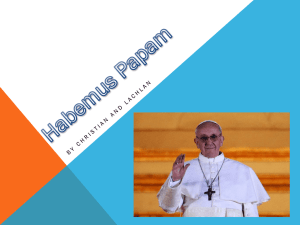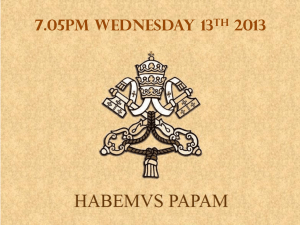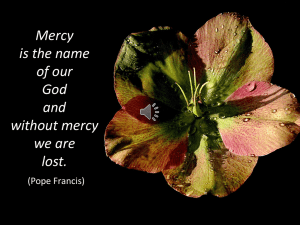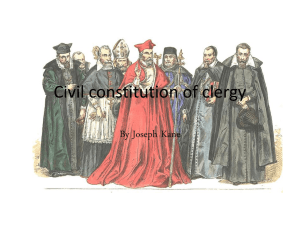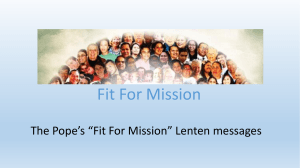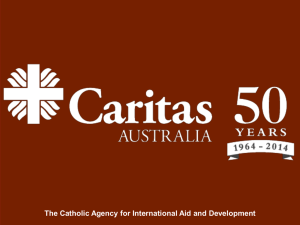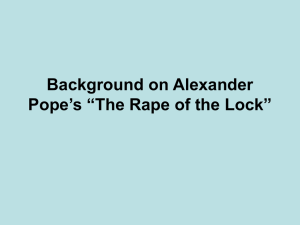Practicing the Truth in Love
advertisement
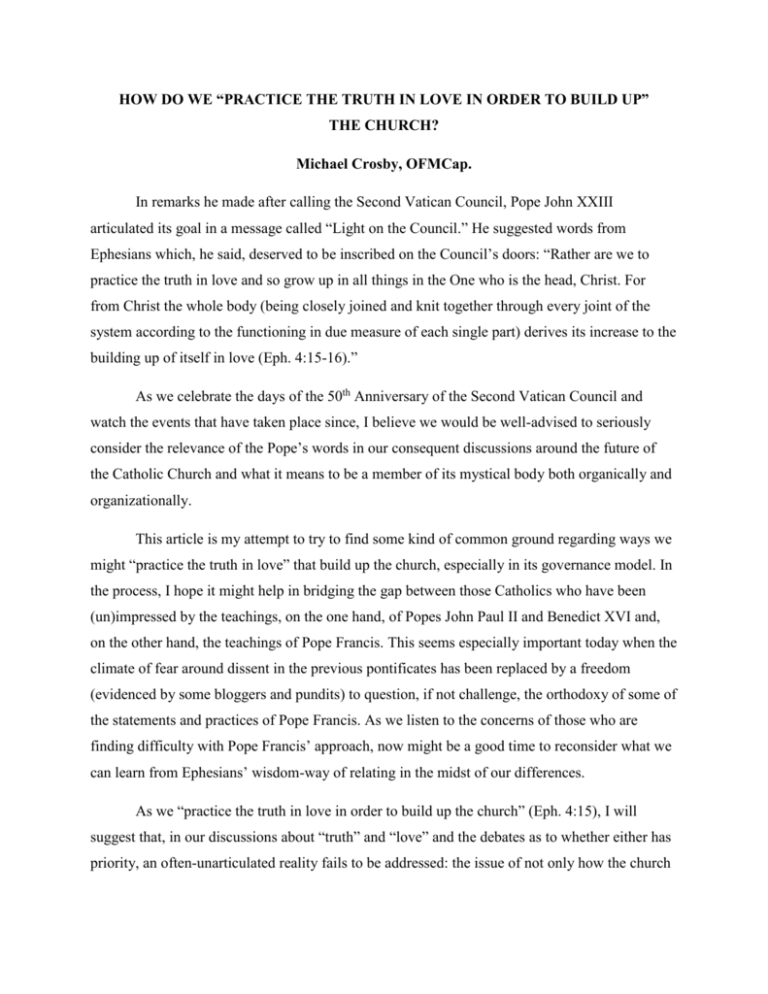
HOW DO WE “PRACTICE THE TRUTH IN LOVE IN ORDER TO BUILD UP” THE CHURCH? Michael Crosby, OFMCap. In remarks he made after calling the Second Vatican Council, Pope John XXIII articulated its goal in a message called “Light on the Council.” He suggested words from Ephesians which, he said, deserved to be inscribed on the Council’s doors: “Rather are we to practice the truth in love and so grow up in all things in the One who is the head, Christ. For from Christ the whole body (being closely joined and knit together through every joint of the system according to the functioning in due measure of each single part) derives its increase to the building up of itself in love (Eph. 4:15-16).” As we celebrate the days of the 50th Anniversary of the Second Vatican Council and watch the events that have taken place since, I believe we would be well-advised to seriously consider the relevance of the Pope’s words in our consequent discussions around the future of the Catholic Church and what it means to be a member of its mystical body both organically and organizationally. This article is my attempt to try to find some kind of common ground regarding ways we might “practice the truth in love” that build up the church, especially in its governance model. In the process, I hope it might help in bridging the gap between those Catholics who have been (un)impressed by the teachings, on the one hand, of Popes John Paul II and Benedict XVI and, on the other hand, the teachings of Pope Francis. This seems especially important today when the climate of fear around dissent in the previous pontificates has been replaced by a freedom (evidenced by some bloggers and pundits) to question, if not challenge, the orthodoxy of some of the statements and practices of Pope Francis. As we listen to the concerns of those who are finding difficulty with Pope Francis’ approach, now might be a good time to reconsider what we can learn from Ephesians’ wisdom-way of relating in the midst of our differences. As we “practice the truth in love in order to build up the church” (Eph. 4:15), I will suggest that, in our discussions about “truth” and “love” and the debates as to whether either has priority, an often-unarticulated reality fails to be addressed: the issue of not only how the church can be “built up” but, even more importantly, how the Roman Catholic Church is built. This involves its governance. Years ago I wrote to Pope Benedict XVI (and repeated in my recent book, Repair My House: Becoming a “Kindom” Catholic), that I do not believe the crisis in the “Church of the West” can be isolated simply to such “isms” as relativism and individualism. I believe a parallel, if not even deeper, crisis exists in response to the irrelevance of much of what has transpired as well as many of the culturally-developed trappings around the existing governance model. These have contributed to the disaffection of many Catholics, including those whom Pope Francis notes as “those who do not attend Mass, to those who have quit or are indifferent” (America interview, 24). Some of this crisis involves consequences derived from a historically-derived form of governance that is no longer relevant for our quantum age. Its ultimate basis in patriarchal clericalism may have once reflected what was thought to be a structure based in creation and derived by nature; however what we know today from science, especially physics, neuroscience and cosmology points to a “truth” that rejects the old structural form of hierarchy that is effectively above, if not outside, the whole or holarchy. Furthermore, because power and authority involve the kind of governance model which has been (and may be adapted) in the Church, I do not think discussions around governance, truth and love can be honestly discussed apart from the rationale that has been used to keep things the way they are and why many today are seeming to be quite alarmed at the actions and gestures of Pope Francis. That is why any honest discussion around the issue of governance must include a notion of “truth” as well as “charity.” That we have quickly entered a new era around the notion of governance in the Roman Church has been made quite clear since February 11, 2013. For those who embraced the patriarchal clerical form of jurisdiction in the Church, just recall the shock of some Catholics that was expressed when Pope Benedict XVI resigned from being Bishop of Rome. Because this Primatial See had come to be equated with an almost infallible kind of Petrine Office (often virtually identified with the Vatican Offices and officials) his resignation itself began a kind of “demystification” of the role of the Bishop of Rome (or the Petrine Office, depending on one’s ideology around the two) that was unprecedented for centuries to the point that it had become almost unthinkable. This was compounded with the election of Pope Francis, whose mandate from the Cardinals seems to have included reform of the Curia (if not the actual governance model) and whose very choice of name was unprecedented and unpredictable. Such events suggest that the possibility of a sea-change in the Holy See has moved from an unimaginative impossibility to a possibility that now appears to be a probability. Different Understandings and Approaches to Truth in Papal Teaching Pope John XXIII’s reference to Ephesians involves a powerful triad for consideration: the practice of truth, the practice of love and the practice of governance. This trinity, grounded in love, is the model by which any and all discussions about “church” and morality should take place. I would suggest, in summary here, that part of the concern being noted by some Catholics used to the way it seemed Popes John Paul II and Benedict XVI used the passage to stress “truth,” now it seems Pope Francis is grounding the priority in love. As a result two different models of governance in the church and how we come to conclusions about morality (and any hierarchy of truths within morality) appear to be in tension. Probably the clearest expression of a de facto priority of the Ephesians’ passage being grounded in truth rather than love arguably has been found in Pope Benedict XVI’s June 29, 2009 encyclical “Caritas in Veritate.” While admitting that, for “the Church, instructed by the Gospel, charity is everything” and, as such is not only “the synthesis of the entire Law” and “at the heart of the Church’s social doctrine,” (no 2), the Pope immediately noted that “charity has been and continues to be misconstrued and emptied of meaning.” Pope Benedict gives his interpretation of the Ephesian passage by noting that we must “link charity with truth not only in the sequence pointed out by Saint Paul, of veritas in caritate (Eph 4:15), but also in the inverse and complementary sequence of caritas in veritate (no. 2).” Grounded in this rationale Pope Benedict crafted his encyclical to highlight the role of truth in society. While acknowledging a desire to make charity and truth “complementary,” the thrust of the encyclical, written in light of his oft-stated concern about the “dictatorship of relativism,” seems to envision charity to be the servant of truth. This seems evident in the very next paragraph: “Only in truth does charity shine forth, only in truth can charity be authentically lived. Truth is the light that gives meaning and value to charity . . . Without truth, charity degenerates into sentimentality. Love becomes an empty shell, to be filled in an arbitrary way. In a culture without truth, this is the fatal risk facing love. It falls prey to contingent subjective emotions and opinions, the word ‘love’ is abused and distorted, to the point where it comes to mean the opposite. Truth frees charity (no. 3).” I don’t’ think it would be wrong to opine that the whole encyclical argues that we are to “practice charity in the truth” not the other way around. In June, 2009, when I first read “Caritas in Veritate” I had two initial reactions. These remain with me to this day. The first was the way I believed Pope Benedict had inverted this passage in the Scriptures to serve his understanding of Tradition in a way that reinforced Jesus’ challenge to the religious leaders of his day: “for the sake of your tradition, you make void the word of God” (Matthew 15:6; Mark 7:13). The other was my ongoing concern about the nature (or notion) of “truth” and how easily, in the name of “truth” ideologies, especially religious ideologies can be used to reinforce positions of power. This latter concern is addressed in my comments which follow. Questioning Truth as “Objective” While I have no problem in subscribing to many propositions of faith and morality that enhance meaning in our lives, I am becoming increasingly concerned about the intellectual integrity connected to an approach to claims about truth regarding faith-matters that are based on some kind of assumed or declared “objectivity” and/or “unalterability” with little or no philosophical or rational verification or basis to prove such claims. Such notions are being increasingly challenged by contemporary scientists and philosophers such as Notre Dame’s Gary Gutting. When religious beliefs are defined as “truth” and these “truths” are interpreted as “objective,” polarization will not be far behind. because, in effect, such “truths” can be subjective. The divisive and debilitating consequences of such argumentation has increased polarization rather than enhance common ground. It has led to a kind of “them” and “us” that too-often has characterized the toxic atmosphere in the Catholic Church (to say nothing of the wider political and economic environment of the United States). Despite the rejection of this “we”/”they” approach which was made by Pope Benedict himself in his last visit to Germany, the polarization around the “us” who possess “the truth” and “them” who are “outside the truth” still too-often defines much of the identity of one who is (not) “truly Catholic.” This approach to truth often masks various political, economic and even, ecclesiastical “idolatries,” as we will see. But first, let us examine how we have come to this polarization and its various ideological justifications. A key finding of neuroscience in the last decades has been the realization that what we heretofore attributed to morality that is taught (as truth) often arises (as different understandings of “truth”) from our nature, reinforced by nurture. Thus we have the research of George Lakoff who has shown in his ground-breaking book, Moral Politics: What Conservatives Know that Liberals Don’t, we basically have two approaches to life, morality and truth. One he calls “the strict father image;” the other is the “nurturing parent image.” As I apply his insights to the past decades of Catholicism, we had forms of a Catholicism under Popes John Paul II and Benedict that often reflected the “strict father” approach to morality as the only way one could be Catholic which now are being challenged by the more “nurturing parent” model of Catholicism being promoted by Pope Francis. A parallel book, but with more sobering consequences for many practicing Roman Catholics, is found in Jonathan Haight’s The Righteous Mind: Why Good People Are Divided by Politics and Religion. His thesis is that, when we don’t just seek the truth but actually believe we possess the truth (by reason of our position or argumentation), it is natural to believe we are right. This sense of being right (in contrast to the other thinking being defined as wrong) often moves us to becoming righteous. When this happens, such judgments about “truth” are cloaked in the mantle of righteousness. Thus, in the only New Testament quote used in Haight’s book, he refers to Matthew 7:3-5 as he concludes: “Anyone who values truth should stop worshipping reason. We all need to take a cold hard look at the evidence and see reasoning for what it is.” Quoting the French cognitive scientists Hugo Mercier and Dan Sperber, he reminds us that”skilled arguers . . . are not after the truth but after arguments supporting their views.” He then concludes: “This explains why the confirmation bias [only considering positions that reinforce your position/power] is so powerful and so ineradicable” (89). While we need to be aware of the personal and group (confirmation) biases and ideological positions that can be cloaked as truth, it must be equally admitted that any healthy governance model in the church must allow for a new model of dialogue that enables disputed issues to be discussed in freedom. While this was difficult, if not threatening, for many moral theologians in the previous papacies, the “nurturing parent” model, with its dialogical model of engagement, offers hope that we can find ways to address critical issues, especially in the areas of life and sexuality. Within this environment concerns around birth control and abortion, traditional and same-sex marriage, death and dying need to be discussed and developed in ways that are truly open to what we know from science about what is considered “natural.” In reference to the final leg of our Ephesians’ triad, just the building-up of this environment of freedom from fear might be the single-best thing that has begun to happen in the Church so that credibility in the teaching of the Church might be restored. Such credibility will be helped when a better balance is brought about that honors all three dimensions of the teaching (and receiving) of truth in the church that involve the papacy and bishops as well as the theologians and the people’s informed consciences. An sign of this new direction is evident in the way the lay people will be consulted by the bishops regarding what matters most to the former: their family life. This, I believe, is already doing much to begin the “repair of the house” (its being “built up” in love) that is needed if governance and teaching in the church will move to a better balance. At the same time it will eliminate the climate of fear that has undermined that kind of dialogue that is necessary to ensure a critical edge in theology in the best sense of what “criticism” means. This brings me to a discussion of the approach of Pope Francis. Pope Francis’ Approach to Truth In his most extensive reflection on “truth” to date, Pope Francis made it clear that his approach to governing will not be based primarily on propositions defined by their promoters with appeals to their notion of “objective truth,” but on the Person of Jesus Christ. While he sees value in promoting a “harmony” among truths that “illumine one another” (Evangelii Gaudium, #39) rather than a “hierarchy” of truths that categorizes some as so important that they may forget that “What counts above all else is ‘faith working through love’ (Gal 5:6)” (Evangelii Gaudium, #37). In his General Audience May 15 he said: “The truth is not grasped as a thing, the truth is encountered. It is not a possession; it is an encounter with a Person.” This encounter, he stressed, is one with the Person of Jesus Christ; it comes to us through the power and energy of the Holy Spirit. He intimated the same thing in his America interview where he spoke of the problems associated with an approach to truth coming from closed-system verses open system-thinking. Recalling a historical period of the Jesuits, he cautioned against this model being used in the wider church. He cautioned against living “in an environment of closed and rigid thought, more instructive-ascetic than mystical.” For Pope Francis, truth for believers is ultimately found in a person; not propositions. The person of Jesus Christ is the foundation of all truth and every other kind of truth. Any other proposed “truth” (outside of the “truth” involved in the twofold Great Commandment) can mask an ideology of unacknowledged power claims and, even more frightening, can become idolatrous. Thus, in his October 15 homily wherein he commented on that day’s passage of the oft-quoted passage from Romans about the truth being known from nature, he noted how one can easily move from interpreting “the passage from faith to idolatry.” People who are unaware of how they may be defining some deeply-held religious belief as “truth” which they reinforced by claims of God-support, when, in effect, it really reflects their own perspective, can be idolaters. He said. “These people, idolaters, have no excuse: because having known God, they have neither glorified nor worshipped Him as God." Continuing this idea (in what seems to me to be a veiled reference to those religious leaders who see themselves as “in possession of truth” by their ordination), Pope Francis asked: “what is the way of idolatry?” He then answered his own question with a powerful insight: “The selfishness of their own thoughts, the omnipotent thought, that which I think is true: I think the truth, I make the truth with my thought." One of the most quoted remarks of Pope Francis from the November, 2013 Bishops’ meeting in Baltimore came from the address by Archbishop Carlo Maria Viganò, the Vatican’s nuncio, to the United States. There he declared: “The Holy Father wants bishops in tune with their people. When this past June I met with him in his simple apartment at the Casa Santa Marta for a fruitful discussion, he made a special point of saying that he wants 'pastoral' bishops, not bishops who profess or follow a particular ideology.” That becoming pastors rather than ideologues demands not only a new approach by the bishops but a new way of thinking. This was made clear by Bishop Blase J. Cupich of Spokane, Washington. Recalling the Nuncio’s comments, he noted that “Pope Francis doesn’t want cultural warriors, he doesn’t want ideologues.” This led him to conclude: “That’s the new paradigm for us, and it’s making many of us think.” Rather than unnecessary and quite futile (as well as self/group-serving) arguments about truth (especially in areas of faith rather than fact) being something that is objective or subjective, I think it is more important that we get our priorities straight in discussing the notion and nature of truth as it is to be understood in the Catholic Church. Like the priority of love over truth for the building up or proper governance in the Church which cannot discount the parallel (if not equal) role of truth in itself, I believe we do need to address the ideological (if not idolatrous) teaching around truth that highlights the “truth” of the papal and episcopal magisterium in a way that does not give proper balance and credence to the legitimate power of the other magisterium found in the truth as articulated in the sensus fidelium and that of the theologians. When this occurs it is often buttressed by the kind of “ideology” that has been rejected by Pope Francis. As I’ve written elsewhere, the ideology that reinforced an approach to governance in the Roman Church stressed the unique “power of the keys” given to Peter (and his successors) but, at the same time, failed to give proper balance to Peter’s power to “bind and loose” found in what I call the “Church of Matthew 16” (the papacy and episcopacy) that is also given to the “Church of Matthew 18” (the wider church of the people). Indeed, in his May 15 reflection on truth, Pope Francis himself seemed to point to a need for a better balance. Asking everyone in that General Audience to pray for the Holy Spirit to be the ultimate source of life, power and governance in the Church, Pope Francis pointed to a proper understanding of truth in the Church when he said that our grounding in the Spirit will find us “as Jesus promised,” guided “into all the truth” (Jn 16:13). Furthermore, he explained: “not only does he guide us to the encounter with Jesus, the fullness of the Truth, but he also guides us ‘into’ the Truth, that is, he makes us enter into an ever deeper communion with Jesus, giving us knowledge of all the things of God.” He went on to caution his audience that “we cannot achieve this by our own efforts. Unless God enlightens us from within, our Christian existence will be superficial. The Church’s Tradition asserts that the Spirit of truth acts in our heart, inspiring that ‘sense of the faith’ (sensus fidei) through which, as the Second Vatican Council states, the People of God, under the guidance of the Magisterium, adheres unfailingly to the faith transmitted, penetrates it more deeply with the right judgment, and applies it more fully in life (cf. Dogmatic Constitution Lumen Gentium, n. 12).” These thoughts were reiterated even more succinctly by the Pope in his recent America interview where he concluded: “We should not even think, therefore, that ‘thinking with the church’ means only thinking with the hierarchy of the church.’” (p. 22). When he realized that he had been chosen by God to govern the people of Israel, Solomon asked: “Give your servant therefore an understanding mind to govern your people, able to discern between good and evil; for who can govern this vast people of yours” (1 Kings 3:9). Governance of the vast people of Solomon’s time took one form. Governance in the Roman Catholic Church of Pope Francis’ time must take another form. This form must be faithful to a better balance between Scriptural understandings of the Church as well as more honesty around the way Tradition has led to the need “to find a new balance” noted by Pope Francis in his America interview (p. 26). Until now many leaders in the church have tended to equate governance almost exclusively with themselves, even appealing to a kind of “divine ordination” that sets them apart from the people. That, Pope Francis has said, clearly reflects a kind of idolatry that must be changed. This change involves an approach to truth that, hopefully, will move beyond categories of left and right, or those equated with only a “strict father” image or “nurturing parent” model; rather they hopefully will enable all of us to move to less righteousness to bring about a deeper understanding of the role of all of us in the pursuit of a governance model that will be faithful to all of the Scriptures and the best of our Tradition. In the process, I think the best prayer all of us can offer is found in the psalm we pray every Friday for Morning Prayer. Guided by the Holy Spirit, in humility and openness, let us make the psalmist’s prayer our own: “You love those centered in truth; in wisdom center me.”

